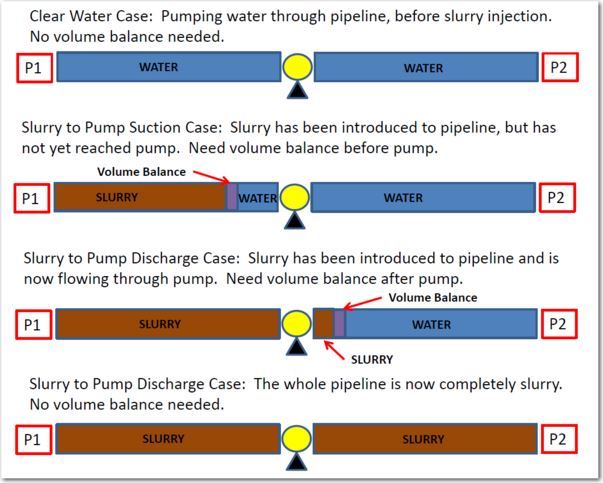Volume Balance
Note:: The Volume Balance junction must be used with great caution. It is only intended to model specific situations and when used incorrectly will give incorrect results. When modeling mixing fluids with varying fluid properties, the Output will likely show a Caution message about the density change. This does not necessarily mean that a Volume Balance should be used at the mentioned location. Refer to Figure 1 below for an example of when the Volume Balance junction can be used appropriately.
The Volume Balance junction type is internal to the piping system and requires two connecting pipes.
The Volume Balance Properties window follows the first of the two basic Properties window formats, displaying the connecting pipes in a fixed format. The flow direction through the junction is determined by the defined directions of the connecting pipes.
The Volume Balance junction is useful for modeling pipelines with a moving interface between fluids of different density. Such a scenario is, in reality, a transient application, because the mass in the system is not steady with time. Fathom is designed to balance mass at all branches, except for the Volume Balance junction. For the Volume Balance, the volume is balanced between the upstream and downstream pipes. This is consistent with the fact that an equal velocity exists at the interface, resulting in a volume balance at the interface.
Volume Balance junctions should be used in conjunction with the variable physical property model, without heat transfer, but with variable density (see Heat Transfer/Variable Fluids panel in Analysis Setup).
The usage of a Volume Balance junction is illustrated with the Slurries With Variable Fluid Properties - SSL example (English, Metric). Figure 1 below provides a summary of the four snapshots in time that occur in the Slurries with Variable Fluid Properties example. In reality, injecting slurry into a pipeline where there are two separate fluids with an interface between is a transient situation.

Figure 1: Four snapshots in time and when to use the volume balance junction is shown for slurries and variable fluid properties systems



